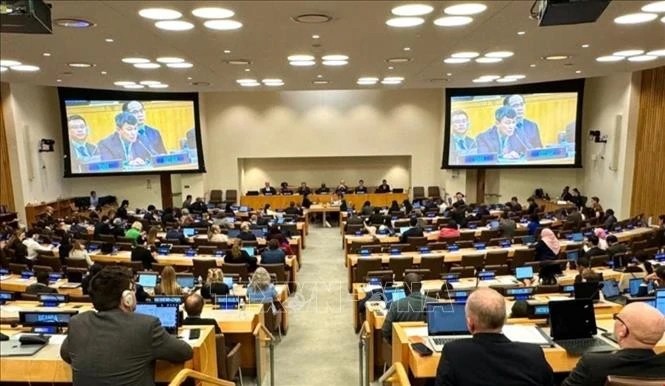UNCLOS 1982: Strengthening Legal Order at Sea, Maritime Cooperation For Peace And Sustainable Development (Part 2)
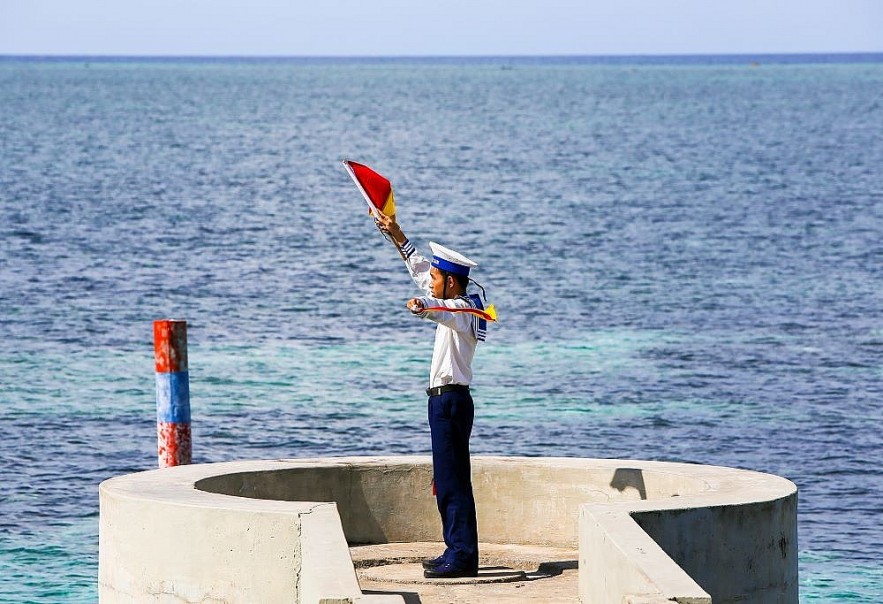 |
| UNCLOS specifically stipulates the rights and obligations of countries. Photo: QT |
Clearly defining the legal regulations of maritime zones
On the basis of international practice, countries recognized in UNCLOS the legal status of all maritime zones, which clearly defines the scope of zones under national sovereignty, sovereign rights, and jurisdiction (including internal waters, territorial waters, contiguous zones, exclusive economic zones and continental shelves), sea areas outside the scope of national jurisdiction (including international seas, international seabed areas and mineral resources there that are the common heritage of mankind).
UNCLOS also specifically stipulates the rights and obligations of countries. The most important maritime regulations of UNCLOS include the exclusive economic zone, continental shelf, islands, artificial structures at sea, and cooperation to protect the marine environment and conserve and manage natural resources.
According to UNCLOS regulations on exclusive economic zones and continental shelves, all activities related to the exploration and exploitation of natural resources in coastal states' exclusive economic zones and continental shelves must be authorized by that country.
Any unlicensed activity is illegal, clearly violating the provisions of the Convention.
Establishing agencies and mechanisms to ensure implementation of the Convention
To ensure full and consistent implementation of the Convention in practice, UNCLOS established agencies and mechanisms with different roles and functions that complement each other.
The specialized agencies established under UNCLOS include (i) the International Seabed Authority, (ii) the Committee on the Outer Limits of the Continental Shelf, (iii) the International Tribunal for the Law of the Sea.
UNCLOS also specifically stipulates the mechanism for resolving disputes arising between countries in the interpretation and application of the Convention (Part XV). The dispute resolution mechanisms at UNCLOS have been used by countries in practice.
The dispute settlement mechanism under UNCLOS only applies to disputes that exist between states in the interpretation and application of UNCLOS (Articles 279 and 288).
They are peaceful measures to resolve international disputes in accordance with international law as recognized in the United Nations Charter, including diplomats and legal processes.
Accordingly, when a dispute arises related to the interpretation and application of UNCLOS, member states are obliged to quickly exchange views regarding the resolution of the dispute through negotiations or other peaceful measures (Article 283).
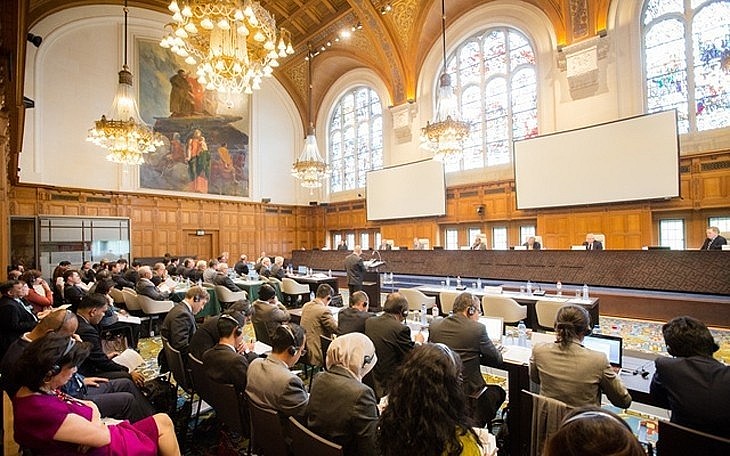 |
| The arbitration court in The Hague held litigation for the Philippines' lawsuit against China related to China's illegal claims in the East Sea. Photo: PCA |
All maritime disputes should be resolved by peaceful means
In some regions of the world, there are still maritime disputes such as delimiting overlapping areas, determining the status of geographical entities at sea, and sharing and exploiting marine resources, especially marine resources.
These disputes stem from the fact that UNCLOS allows countries to establish large sea areas under national jurisdiction, thereby creating areas of overlapping claims between countries with opposite or adjacent sea areas.
The root cause is the important role of the sea and marine resources in the development of countries. There are maritime disputes that also stem from some countries' excessive claims that are completely contrary to UNCLOS.
Facing many maritime disputes in regions around the world, the international community largely agrees that countries need to fully respect and implement UNCLOS, clarify claims and resolve disputes.
Only by peaceful measures in accordance with international law, including UNCLOS, we can soon reach a satisfactory solution to the dispute between the parties involved, or in the immediate future, we can find a temporary solution and move forward to achieve a fair and lasting solution to the dispute, ensuring the legal rights and legitimate interests of the parties involved.
In the context of complicated developments in the East Sea, to ensure peace, stability, security, safety and freedom of navigation in the region and the world, for the common interests of the region and the international community, countries need to respect the legal order at sea established in UNCLOS.
They need to respect diplomatic and legal processes, including ongoing negotiation processes, and avoid moves to erode or downgrade the role of UNCLOS.
As a coastal country and member of UNCLOS, Vietnam has been making persistent efforts to peacefully resolve East Sea issues in accordance with international law including UNCLOS. Vietnam has also been fully implementing UNCLOS since accepting the binding of UNCLOS and becoming a member state of UNCLOS. Vietnam needs to continue efforts with other member countries to promote respect for UNCLOS, while protecting the integrity and legal value of this global legal framework.
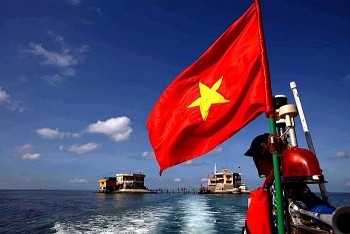 | UNCLOS 1982: Vietnam's Contribution to Maritime Delimitation With the UNCLOS 1982, Vietnam is a successful country in Southeast Asia, resolving maritime disputes with the most diverse tools. During the process, Vietnam has ... |
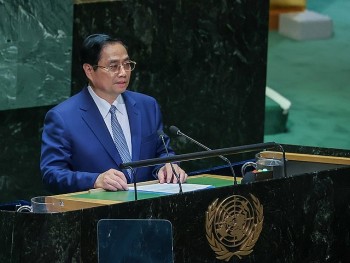 | UNGA 78: PM Pham Minh Chinh Proposes Strengthening Strategic Trust To Tackle Global Challenges At the general debate of the 78th session of the UN General Assembly (UNGA 78) in New York on September 22, Vietnam's Prime Minister Pham ... |
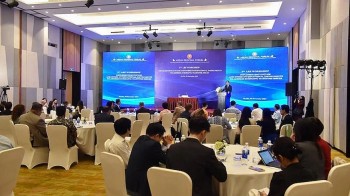 | Fifth ASEAN Regional Forum Workshop on Implementing UNCLOS 1982 The Ministry of Foreign Affairs coordinated with the embassies of Canada, Australia, New Zealand, and the EU to hold the fifth ASEAN Regional Forum (ARF) ... |
Recommended
 Seas and islands
Seas and islands
Vietnam Endorses Common Voice on Ocean Jurisdiction
 Seas and islands
Seas and islands
Dialogue as Key to Settling Disputes and Advancing Law of the Sea
 Seas and islands
Seas and islands
RoK Navy Ship Pays Friendly Visit to Da Nang City
 Seas and islands
Seas and islands
Naval Region 5 Promotes Reading Culture, Fosters Patriotism
Popular article
 Seas and islands
Seas and islands
Coast Guard Region 2 Command Hosts Philippine Coast Counterpart
 Seas and islands
Seas and islands
Vietnam - Thailand Navy: Coordination to Well Address Problems at Sea
 Seas and islands
Seas and islands
Honoring the Fallen: Incense Offering for the 37th Anniversary of Gac Ma
 Seas and islands
Seas and islands





